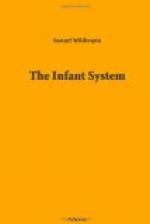N.B. If visitors wish any particular lessons to be gone through, and the children appear disposed, the master is not bound to adhere to the above rules, neither at any other time, if the children appear particularly disinclined.
* * * * *
There are a few other matters, on which, before concluding this chapter, I must speak, as claiming the attention of infant school conductors. First attend to
CLEANLINESS.
Although we have referred to this before, yet, as it is of considerable importance not only to the children but to those around them, it may not be amiss to take up a little more of the reader’s time, and to state the different plans that have been devised, in order to make the children as clean as possible. In one case, a trough was erected, and a pipe provided to convey the water into it; but before it had been up a month, it was found, that instead of answering the end intended, it had quite a contrary effect; for the children dabbled in the trough, and made themselves ten times worse than they were, by wetting themselves from head to foot; besides which, it frequently caused them to take cold, of which the parents complained. Some took their children away without notice; others came and gave the master what they called “a good set down.” It was, therefore, thought necessary to forbid the children washing themselves, and to wash all that came dirty. But it was soon found that the dirty children increased so fast, that it required one person’s time to attend to them; besides which, it had another bad effect, it encouraged the parents in laziness; and they told me, when I complained of their sending the children to school dirty, “That indeed they had no time to wash their children; there was a trough in the school for that purpose, and the persons who had charge of the school were paid for it, and ought to do it.” In consequence of this, the trough was taken away, and it was represented to the parents, that it was their duty to keep their children clean; that unless they did so, they would be sent home to be washed; and if they persisted in sending them without being washed, there would be no alternative left but to dismiss them from the school altogether. This offended some of the parents, and they took their children out of the school, but many afterwards petitioned to have them readmitted. I mention this merely to prevent others, who may be concerned in the establishment of infant schools, from incurring an unnecessary expense, and to shew that the parents will value the school equally as well if you make them wash their children, as if you did it for them.




